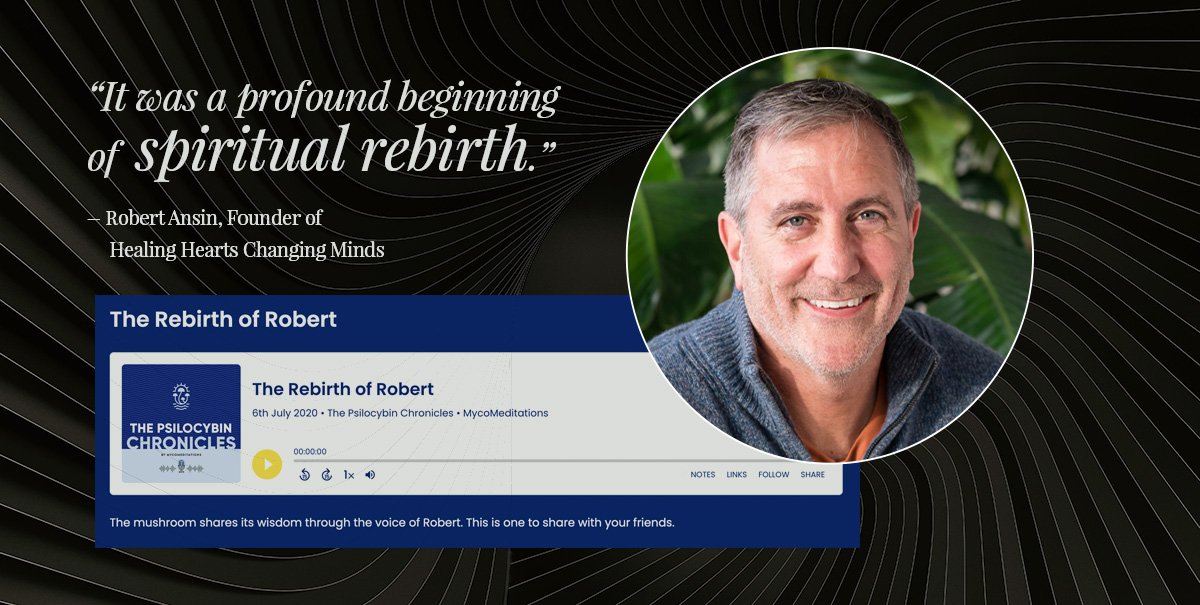Our History
A Philanthropist’s Plan to Spread a “Good Virus” Around the World
Massachusetts-born entrepreneur Robert Ansin has always been driven by two passions: to innovate and to give back. After attending three life-changing psilocybin retreats in Jamaica, he was inspired to create Healing Hearts Changing Minds. Ansin now wants to give others the opportunity to process their own traumas and unpack the roots of their mental health problems―and then go back to their communities to spread the healing.
Robert’s family is also a foundational inspiration for the creation of Healing Hearts Changing Minds. The organization is focusing its initial funding on future facilitators from the LGBTQIA+ communities. Robert's connection with this community traces back to his childhood in the 1970s when his father, Ron, came out as bisexual. Ron later became a prominent advocate and philanthropist within the gay community.
Robert is also the proud father of two children, Indigo and Olly. Robert has gained valuable insights for this work through supporting Indigo on their gender affirmation journey.
Learning about life on the factory floor
Ansin, who was born into a family of Massachusetts-based shoe manufacturers, learned the value of humility as well as endurance on the floor of the thriving shoe factory his father owned in Fitchburg, where he worked as a teenager. “Not only did I learn the importance of a strong work ethic, but also that I was no better than any of the good, hard-working people around me.”
But he also saw how, even after years of loyal service, there were no guarantees for his father’s employees, who were buffeted about by economic forces beyond their control. When the free market policies of the 1980s led to the influx of cheap shoes from around the world, his father’s factory took a major hit. “People who had worked for the factory for years were suddenly unemployed. And the city went from thriving to blighted in front of my eyes.”
“This had a profound impact on me,” Ansin says. “I remember thinking, how can this be allowed to happen?” After graduating from college and going into real estate, Ansin took on his first challenge― renovating a massive, abandoned mill in Fitchburg that had become a hollowed-out husk after the collapse of the local manufacturing industry.
His father backed his plan to try to bring the city back to life and soon small businesses were springing up in the re-purposed mill. Ansin launched his sustainable development company, MassInnovation LLC, and began renovating other disused mills dotted around the state―converting them into thriving hubs that housed schools, apartments, retail centers. He remembers being extremely grateful for how well his career was going in 2006.
“I realized I could bend in ways I didn’t think I was capable of”
“Then 2008 happened,” he recalls. “The great recession was devastating. At the time I was mid-way through a $200-million renovation of what was once the largest mill in the world (comprised of 3 million square feet), but before I knew it, I was edging toward bankruptcy.”
Ansin was able to claw his way back to being a successful businessman and he now looks back on those difficult years with gratitude. “I realized that I could bend in ways I didn’t think I was capable of, without breaking.”
But the real estate business had lost its spark for him, and Ansin sold his business and embarked on a quest to find deeper meaning. After reading Michael Pollan’s How to Change Your Mind he decided to attend a retreat himself. On his third trip of the first retreat, he had an epiphany. “I realized that what I wanted to do most was what I had always wanted to do as a kid: make the world a better place. I realized also that the most joy I’d ever had had come from helping others.”
Spreading a “good” virus around the world
He wanted to give to others the same healing opportunity that he had had. “I also saw it through the lens of a businessperson. I thought of the Return On Investment: if many more people were able to attend retreats in the considered way that I’ve been able to, especially with proper integration afterwards, and with a commitment to doing work on themselves back home, how much wisdom and healing could they spread back to their communities?”
Ansin says he sees it “almost like a virus, but a good virus. We know so much about how a bad virus can spread rapidly around the world, but what if the same could happen with a good virus. Why don’t we have a word for that?” he laughs.
As someone who was born into privilege, he says he would not presume to know what it’s like to have one’s path blocked by poverty, racism, gender or sexual identity―not to mention mental illness and trauma that so often goes untreated.
An epidemic of mental illness
“We know that plant medicine has the potential to disrupt the legacy of generational trauma, to bring about emotional healing. Imagine the benefit it could bring then to communities that don’t have proper access to mental health services? And even for those that do, the tools we have may help us to manage some of the symptoms, but they don’t help us to uncover our underlying traumas. Or deal with the epidemic of mental health illness that we have right now―anxiety, depression, PTSD, addiction. The list goes on.”
His “shooting for the stars” vision for Healing Hearts is to send armies of healed people back into their communities. “Who better to heal a community than a person who comes from that community?”
New tracks after a snowstorm
“We are all born with unlimited potential, and to be able to help people get back to their original selves, to become the leaders they were meant to be, then I believe the solutions will come from those communities themselves.”
Not that plant medicines are a magic bullet. “But they give us the opportunity to uncover deeply buried traumas and find new pathways―like making new tracks after a snowstorm. And integration helps us to stay in touch with the experience and rediscover that part of ourselves that got crushed in childhood.”
Ansin is hopeful that those with means who have experienced the healing power of psychedelics might reach into their pockets to support Healing Hearts. “We’ve learned a lot about the science of generosity,” he says. “We know that the happier someone is, the more generous they tend to be. I see being a donor as part of the successful integration of the psychedelic experience. You’re not only benefiting yourself but those around you, and those beyond your circles too. You’re seeing the potential that psilocybin offers to help heal the world and you’re contributing to that endeavor.”
The Rebirth of Robert
The Psilocybin Chronicles Podcast

“I see being a donor as part of the successful integration of the psychedelic experience. You’re not only benefiting yourself but those around you, and those beyond your circles too.”
―Robert Ansin



